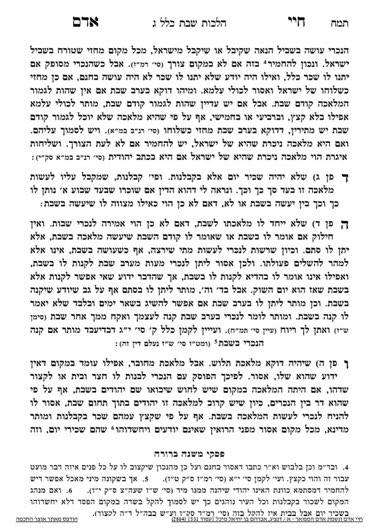We are continuing in siman 5, where the Chayei Adam discusses the fourth criterion for it to be permitted to make an arrangement with a non-Jew before Shabbos regarding melacha on Shabbos. This criterion is that the Jew cannot direct the non-Jew to specifically perform the work on Shabbos. Rather, the Jew must let the non-Jew perform the melacha on his own volition, and if he decides to perform it on Shabbos, it is his own choice.
We left off discussing an item that was purchased by non-Jew (who fulfills all of the criteria so that there is no shlichus) for a Jew on Shabbos. We learned that bedieved, one may be lenient regarding a case of something purchased and use it on Shabbos itself, in accordance with the opinion of the Shulchan Aruch.
The Shulchan Aruch can be found in siman 252 seif 4. The Shulchan Aruch discusses a case where a non-Jew is hired as a kablan with a ketzitza (financial arrangement) to produce a garment. The non-Jew makes the item on Shabbos and gives it to the Jew. The Shulchan Aruch writes that it is muttar to wear. The Rema brings the opinion of the Rashba who says that one may not use the item. Even if one is machmir when an actual melacha is done (weaving or sewing a garment), in the case above where the non-Jew purchased the item on Shabbos, which only involves an issur mederabanon, one can be meikel and use the purchased item on Shabbos.
The Mishnah Berurah there (sk 27) asks that we see that later, the Shulchan Aruch writes that if a non-Jew turns on the lights for a Jew, the Jew may not benefit from the lights. This is true even if the non-Jew is hired as a kablan before Shabbos to perform this task. Why is there a difference between our scenario of a purchase, where bedieved one may benefit, and this scenario of the lights, where one may not even benefit bedieved?
The Mishnah Berurah explains that in the case of the lights, the intent of the non-Jew is that the Jew benefit for immediate use. In the case of the clothing, even though the Jew benefits on Shabbos, it was not necessarily for the Jew to use on Shabbos. The non-Jew was making clothing on shabbos to get it done with, as the Jew had not indicated that he specifically needs it for Shabbos
The Mishnah Berurah continues, and writes if a Jew hires a kablan for work and asks the non-Jew to try to finish the work on Shabbos, even though the non-Jew was not bound by that request, once the non-Jew performs the work on Shabbos, he is doing so for the Jew to benefit on Shabbos, so the Jew may not benefit from that melacha.
Therefore, the Mishnah Berurah writes in siman 307 that if the non-Jew buys perishable foods for the Jew on Shabbos, we assume that the intent is for the Jew to use the food immediately, on Shabbos, so that would be a problem.
If a Jew hires a kablan to perform work for him on erev Shabbos, and says that he needs to work completed right after Shabbos, it is a problem of meyacheid melachto, as we have learned. We need to discuss when the Jew requests the work be completed by Monday morning, but the store is closed on Sunday. If the store will deliver it to the Jew by Monday morning, it would seem at first glance that this would be an issue of meyacheid melachto for Shabbos, because the non-Jew does not have the discretion to perform it on Sunday. On the other hand, one could argue that the non-Jew does have the discretion to perform the work on Sunday, and the fact that the store is closed on Sunday is his own choice.
Rav Moshe holds that this situation is not called meyacheid melachto. Thus, for example, if one drops off a car by a mechanic right before Shabbos and requests it be completed by Monday morning, even though the shop is closed on Sundays, it is muttar.
However, others disagree and hold that even though the non-Jew is a kablan, once it is clear that the arrangement is such that the non-Jew will perform the work on Shabbos, the Jew is essentially asking the non-Jew to work for him on Shabbos, because the Jew knows that will be the inevitable reality. One should ask their rav should such a situation practically arise.
Summary
- If one instructs a non-Jew before Shabbos, there are times when it will be muttar, depending on eight conditions.
- The fourth condition is that the Jew cannot direct the non-Jew to specifically perform the melacha on Shabbos. Rather, one must give him work without a specific timeframe, so that if the non-Jew chooses to perform the work on Shabbos, it is out of his own volition.
- One should be machmir not to benefit from permitted melacha performed by a non-Jew on Shabbos itself.
- One may be lenient to benefit, on Shabbos, from an item purchased on Shabbos by the non-Jew, as long as the non-Jew did not have intent for the immediate benefit of the Jew.
- There is a machlokes regarding one who gives work to a kablan in a way that the kablan inevitably has to work on Shabbos or at a time at which he does not normally work. One should ask their rav.



